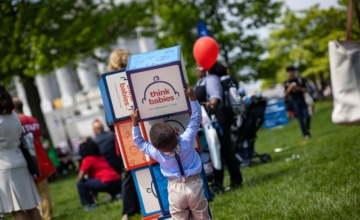Spring and summer have brought several state budget wins for babies and toddlers across the nation, in some cases, via increased funding through the federal Child Care and Development Block Grant. While there is still plenty of room for improvement, let’s take a moment to reflect on a few of the latest outcomes of the work of persistent and powerful voices for our youngest children.
- California’s budget included nearly $1 billion over the next four years for an early care and education (ECE) package to support quality improvement initiatives, improve practices to support dual language learners, add child care slots, increase ECE provider reimbursement rates, and increase funds available for ECE programs in low-income areas. The budget also included the first-ever statewide investment in voluntary, evidence-based home visiting.
- Colorado’s legislature approved the continuation of the Child Care Contribution Tax Credit until 2025 and expanded access to the state’s refundable Child Care Expenses Tax Credit to help working families better afford child care. The legislature also approved a 22% increase over last year’s budget for the state’s Child Care Assistance Program.
- Hawaii’s budget added $2 million for early intervention services for infants and toddlers with developmental delays.
- Illinois’ budget included a $50 million increase to expand and improve birth-to-five programs and services and an additional $7.2 million for early childhood capital improvement funds for construction and renovation projects.
- Maryland’s General Assembly put together three anti-hunger programs in order to ensure that all children have access to healthy, nutritious foods, including offering $200,000 in matching funds that people receiving federal benefits can use to buy food at their local farmers markets. The budget also added $11.5 million in additional funding for the Child Care Subsidy Program, ending the state’s waitlist and increasing rates by 8%.
- New York provided new funding to support implementation of the state’s First 1,000 Days on Medicaid plan, aimed at improving the health and development of the nearly 60% of infants and toddlers covered by Medicaid in the state. The final budget also included more than $100 million in new investment in child care subsidies.
- North Carolina allocated $19.5 million to reduce the wait list for child care subsidies by approximately 3700 slots and increased subsidy rates for infant-toddler care to the 100th percentile of market rate in priority counties.
- Pennsylvania’s budget included a $6.7 million increase for home visiting services to serve additional families, provide professional development for child welfare, treatment and home visiting staff and fund a COLA for pre-existing state funded home visiting programs. The state also added $6.7 million to address the child care subsidy wait list.
- Rhode Island established tiered quality rates in statute for the Child Care Assistance Program with a $3.6 million increase in rates for child care centers. Effective July 1, 2018, centers received up to a 33% increase for infants and toddlers. The new rate for five-star programs meets the federal benchmark for equal access to quality care (75th percentile of 2018 Market Rate Survey).
- Utah’s budget established a one-time $1 million grant program to pilot local Intergenerational Poverty Initiatives.




